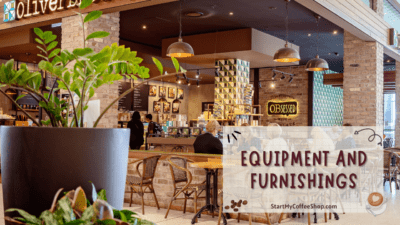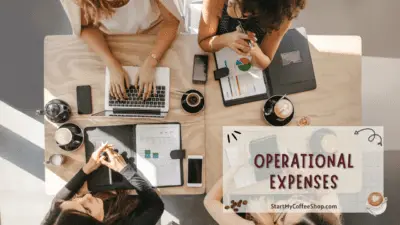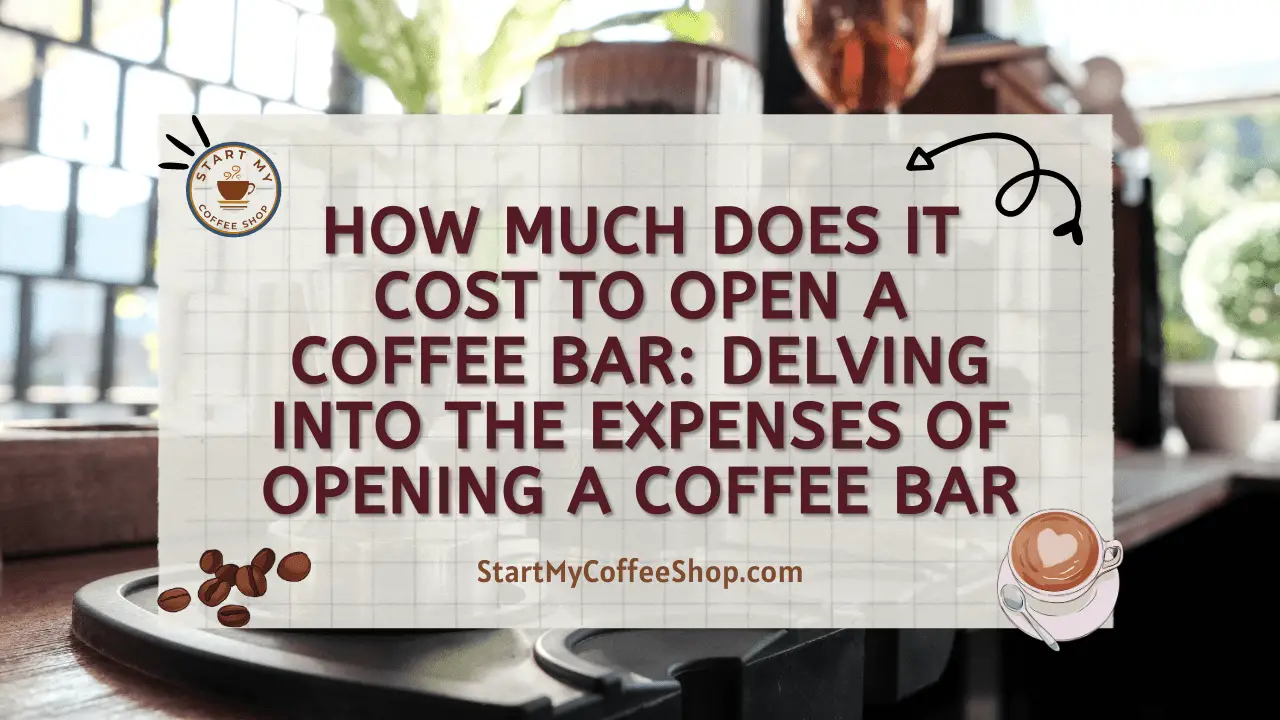Opening a coffee bar can be an exciting venture for coffee enthusiasts and entrepreneurs alike. However, before diving into the world of latte art and espresso shots, it’s important to understand the financial aspects involved. One of the crucial questions that arise is, “How much does it cost to open a coffee bar?”
The cost of opening a coffee bar can vary widely, depending on factors such as location, size, equipment, furnishings, permits, and renovations. On average, it could range from $80,000 to $300,000 or more. It’s a blend of expenses, but with the right beans and a dollop of passion, you’ll brew up some greatness!
In this article, I will explore the various factors that influence the cost and provide insights into the estimated expenses associated with opening a coffee bar.
1. Location
Firstly, rental costs can be a significant portion of your budget, especially in sought-after areas. Prices for commercial spaces can vary depending on the size, amenities, and popularity of the neighborhood. Additionally, property taxes may differ based on the location, potentially affecting your financial planning.
Utilities are another factor to take into account. Costs for electricity, water, heating, and cooling can vary depending on the region and the size of your coffee bar. Understanding and estimating these utility expenses will help you create a more accurate budget.
Although choosing a prime location can be more expensive, it comes with potential benefits. Being in a high-traffic area or near complementary businesses can enhance your visibility and draw in footfall. Ultimately, the right location can contribute significantly to the growth and profitability of your coffee bar.
2. Size Matters
The size of your coffee bar is a crucial factor that directly influences the overall cost of setting up your business. Larger spaces generally require more resources for construction, furnishings, and equipment, leading to higher expenses.
The costs associated with outfitting and decorating a larger area can quickly add up. Moreover, with a bigger space, you may need a larger inventory of coffee beans, milk, syrups, and other supplies to meet the demands of a larger customer base.
In addition to the initial setup costs, operating a larger coffee bar may require hiring more staff to handle the increased operations. This includes baristas, servers, and support staff to provide efficient and quality service to customers. Staffing costs, including wages, benefits, and training, should be factored into your budget.
On the other hand, smaller, more intimate coffee bars can be a cost-effective option, particularly for those with limited budgets. A smaller space generally requires less construction and fewer furnishings, resulting in lower upfront costs. It also requires a smaller staff size, which can help control ongoing operational expenses.
When deciding on the size of your coffee bar, it’s crucial to strike a balance between the available space and the expected footfall. A larger space may be suitable if you anticipate a high volume of customers, but it also entails higher costs. Conversely, a smaller, cozier setting can create a more intimate atmosphere and be financially advantageous for those starting.
3. Equipment and Furnishings
Investing in high-quality coffee-making equipment is paramount when aiming to deliver exceptional beverages that satisfy the discerning taste buds of your customers. However, it’s important to note that such equipment can significantly contribute to the overall cost of opening a coffee bar. Espresso machines, grinders, brewers, and other essential tools are crucial for producing top-notch coffee, but they can quickly add up in terms of expenses.

When budgeting for your coffee bar, you must consider both the initial investment and the ongoing maintenance expenses associated with the equipment. It’s not just about purchasing the machinery; you also need to factor in regular servicing, repairs, and replacements to ensure the longevity and efficiency of your equipment.
Furthermore, the ambiance of your coffee bar also plays a significant role in attracting and retaining customers. Furnishings such as tables, chairs, lighting, and decor contribute to the overall atmosphere and customer experience. While they may not directly affect the taste of the coffee, they enhance the visual appeal and comfort of your space. The cost of these furnishings should be taken into account when calculating the total expenses.
While investing in high-quality coffee-making equipment and furnishings can be a substantial upfront cost, they are essential elements that contribute to the overall growth and reputation of your coffee bar. Striking a balance between quality and cost-effectiveness is crucial to provide an exceptional coffee experience while managing your financial resources effectively.
Read more about Cost to Open Scooter’s Coffee Shop: Mapping Out the Financial Landscape
4. Permits and Licenses
Health permits are typically required to ensure that your coffee bar meets the necessary sanitation and hygiene standards. These permits involve inspections and adherence to specific guidelines, protecting both the customers and the reputation of your establishment. Food handling certifications are also often necessary, demonstrating that your staff is trained in safe food handling practices.
If you plan to serve alcoholic beverages, obtaining a liquor license is essential. This license ensures that you are legally permitted to sell and serve alcoholic drinks. It involves a separate application process and may come with specific regulations and restrictions, depending on the jurisdiction.
Other permits and licenses may include signage permits, zoning permits, fire safety permits, and more. It is crucial to research and understand the specific requirements in your area and allocate funds in your budget to cover the associated costs.
Failure to obtain the necessary permits and licenses can result in severe consequences, such as fines, closure orders, or legal liabilities. Therefore, investing the time and resources to ensure compliance with the applicable regulations is an essential step in opening and operating a coffee bar. By doing so, you can establish a strong foundation for your business while demonstrating your commitment to safety and adherence to the law.
5. Renovations and Interior Design
Renovations and interior design play a vital role in transforming a space into a functional and inviting coffee bar. Converting a space to meet the specific requirements of a coffee bar typically involves various tasks such as remodeling, plumbing, electrical work, and aesthetic enhancements.
The cost of renovations can vary significantly depending on several factors. The initial condition of the space, including any structural or layout changes needed, can impact the expenses. The desired design elements, such as flooring, countertops, seating arrangements, and lighting, also contribute to the overall cost. Additionally, if extensive changes are required to meet health and safety regulations or to accommodate specific equipment, the expenses may increase accordingly.
It is important to carefully plan and budget for these renovation costs. Obtaining quotes from contractors or professionals experienced in coffee bar renovations can help in estimating the expenses accurately.
By considering the necessary renovations and interior design elements, you can create a welcoming and functional coffee bar that aligns with your vision and provides an enjoyable experience for your customers.
6. Staffing and Training
Building a skilled and efficient team is crucial in ensuring excellent service and maintaining high levels of customer satisfaction in your coffee bar. The cost of staffing encompasses various elements, including wages, benefits, and training expenses.
Wages make up a significant portion of the staffing costs, as you need to compensate your employees fairly for their work. Additionally, offering benefits such as health insurance, retirement plans, or paid time off can attract and retain talented staff members.
Investing in training is also essential. By providing comprehensive training programs, you can equip your baristas with the skills and knowledge needed to master the art of coffee-making. Well-trained baristas can create consistently exceptional beverages, enhancing the reputation and achievement of your coffee bar.
It’s important to allocate a portion of your budget to staff development and training initiatives. Regularly investing in training sessions and workshops can keep your team updated on the latest industry trends and techniques, ensuring that they deliver top-notch service to your valued customers.
7. Marketing and Branding
To attract customers and foster a loyal following, investing in effective marketing and branding strategies is crucial for your coffee bar. Building a strong brand identity involves creating a compelling story, designing a memorable logo, and crafting a unique visual aesthetic that resonates with your target audience.
Developing a professional website is essential in today’s digital landscape. It serves as a virtual storefront where potential customers can learn about your coffee bar, explore your menu, and find contact information. Implementing search engine optimization (SEO) techniques can help improve your online visibility, making it easier for people to discover your business when searching for coffee-related keywords.
In addition to online efforts, consider traditional advertising methods to reach a broader audience. This may include print ads in local publications, flyers, or even collaborations with other local businesses or community events to increase brand awareness.
Furthermore, implementing targeted digital marketing campaigns can be highly effective. Utilize social media platforms to engage with your audience, share enticing visuals of your coffee offerings, and run promotions or contests to drive customer participation and loyalty.
8. Operational Expenses

In addition to the initial setup costs, it is essential to consider the ongoing operational expenses when budgeting for your coffee bar. These expenses encompass various aspects required for the day-to-day functioning of your business.
Inventory costs for coffee beans, milk, syrups, and other consumables are recurring expenses that need to be accounted for. Maintaining an adequate supply of high-quality ingredients is crucial for consistently serving excellent beverages to your customers.
Utilities, including electricity, water, and gas, are essential for running your coffee bar. Additionally, regular maintenance and repairs of equipment, fixtures, and facilities are necessary to ensure smooth operations and a comfortable environment for both staff and customers.
Insurance is another ongoing expense that should not be overlooked. Having comprehensive coverage protects your business from potential liabilities and unforeseen circumstances, providing peace of mind.
Other overhead costs, such as marketing expenses, administrative fees, and licensing fees, should also be factored into your budget. It’s important to have a comprehensive understanding of these ongoing operational expenses to manage your finances effectively and ensure the long-term sustainability of your coffee bar.
Read more about Cost to Run a Small Coffee Shop: Setting the Budget for Your Coffee Shop
9. Contingency Fund
While careful planning and budgeting are essential for estimating costs, it is prudent to have a contingency fund in place. Unexpected expenses, market fluctuations, and unforeseen circumstances can arise, posing challenges to the financial stability of your coffee bar.
Maintaining a financial safety net provides a buffer to handle unexpected situations. It allows you to address urgent repairs, equipment replacements, or unexpected costs without compromising the daily operations or compromising the quality of your offerings.
By having a contingency fund, you can adapt and respond effectively to unforeseen events, such as changes in market trends or emergencies, ensuring the long-term sustainability of your coffee bar.
It provides peace of mind and safeguards your business against potential financial setbacks, enabling you to focus on providing exceptional service and maintaining the progress of your coffee bar.
Summary
Opening a coffee bar requires a thorough understanding of the associated costs. From location and size to equipment, permits, staffing, and marketing, numerous factors contribute to the overall expense. On average, the cost of opening a coffee bar can range from $80,000 to $300,000 or more, depending on the unique circumstances of each venture.
By carefully considering these factors and creating a comprehensive budget, you can embark on your coffee bar journey with confidence. Remember, it’s not just about the cost—it’s about the passion, quality, and experience you bring to your customers. With proper planning and a touch of creativity, your coffee bar can thrive in the ever-growing and competitive coffee industry.
Frequently Asked Questions

Q: Do I need any specific permits or licenses to open a coffee bar?
A: Yes. These may include health permits, food handling certifications, liquor licenses (if serving alcoholic beverages), and compliance with local regulations. It’s important to research and adhere to the legal requirements in your area.
Q: How much should I budget for coffee-making equipment?
A: It’s advisable to budget a significant portion of your expenses for essential equipment such as espresso machines, grinders, brewers, and other necessary tools. This investment in quality equipment is crucial for delivering exceptional coffee.
Q: What ongoing operational expenses should I consider for my coffee bar?
A: These include inventory costs for coffee beans, milk, syrups, and other consumables. Utilities, maintenance, insurance, and staff wages should also be factored into your budget to ensure the smooth operation of your coffee bar.
To learn more on how to start your own coffee shop checkout my startup documents here
Please note: This blog post is for educational purposes only and does not constitute legal advice. Please consult a legal expert to address your specific needs.

Hi! I’m Shawn Chun
My adventure in coffee began when I first launched my first coffee shop back in the early 2000s. I had to figure out so many things on my own and to make it worse within 2 years of opening two large corporate coffee chains moved in just blocks away from me!
As I saw smaller and even some larger coffee shops in the neighborhood slowly lose customers to these giant coffee chains and slowly close up shop, I knew that I had to start getting creative…or go out of business.
I (like you may be) knew the coffee industry well. I could make the best latte art around and the foam on my caps was the fluffiest you have ever seen. I even had the best state-of-the-art 2 group digital Nuova Simonelli machine money could buy. But I knew that these things alone would not be enough to lure customers away from the name brand established coffee shops.
Eventually, through lots of trial and error as well as perseverance and creativity I did find a way to not only survive but also thrive in the coffee/espresso industry even while those corporate coffee chains stayed put. During those years I learned to adapt and always faced new challenges. It was not always easy, however, in the end, I was the sole survivor independent coffee shop within a 10-mile radius of my location. Just two corporate coffee chains and I were left after that year. All told the corporate coffee chains took down over 15 small independent coffee shops and kiosks and I was the last one standing and thriving.
Along the years I meet others with the same passion for coffee and I quickly learned that it is not only “how good a barista is” that makes a coffee shop successful, but the business side of coffee as well.
Hence why I started this website you are on now. To provide the tools and resources for up and coming coffee shop owners to gain that vital insight and knowledge on how to start a coffee shop successfully.
Stick around, browse through my helpful blog and resources and enjoy your stay! With lots of LATTE LOVE!
Shawn







